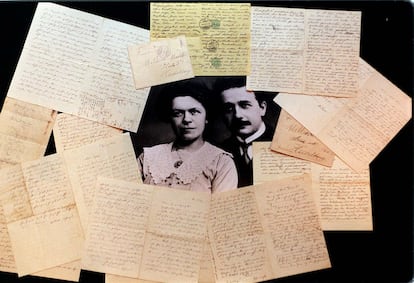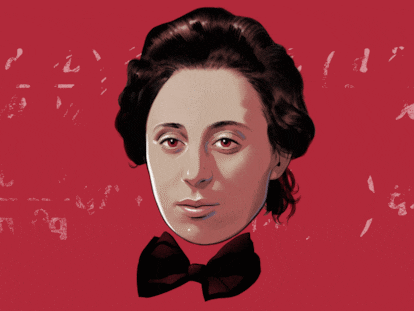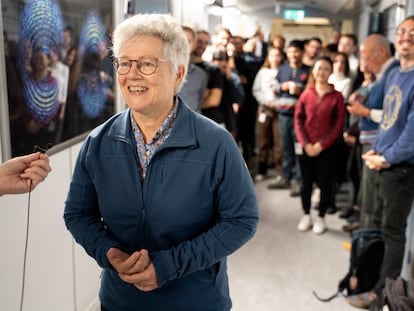‘Mileva Einstein, theory of sadness’: when the physicist wanted to turn his wife, and brilliant mathematician, into his maid
Croatian novelist Slavenka Drakulić reconstructs the terrible circumstances that marked the life of the first wife of the future Nobel Prize winner. She contributed greatly to the development of Einstein’s theories

In July of 1914, Albert Einstein sent his wife — Mileva — a note through a mutual friend, explaining what she had to do so that they could continue being together: wash his clothes, prepare three meals a day, clean the bedroom and tidy up his office (which only he would use). “You will refrain from any relationship with me, unless it’s necessary for social reasons,” he told her, forcing her to give up spending time with him at home and taking trips together. There would be no intimacy — only the bare minimum amount of contact — and absolutely no turning their children against him. These were his conditions: he asked Mileva to accept them.
They had just settled in Berlin, although, at the time, they were living separately. Einstein had been named a member of the Prussian Academy of Sciences, a professor at the Humboldt University and director of the Kaiser Wilhelm Institute of Physics: he would finally have the time and resources to carry out his research. But Mileva had heard rumors that Albert was in love with his cousin, Elsa Löwenthal (they would end up marrying in 1919), who he had spent time with while staying at his mother’s house. Mileva and her children were staying with friends.
These conditions — which Slavenka Drakulić reproduces in italics — are from one of the few real documents that she explicitly cites in her novel. There isn’t even an iota of invention in what’s nothing more than a note, an ordinary piece of paper… although the simple letter starkly defines the world that Mileva lived in and all the things she had to deal with. She was sure that she would end up giving in and that she would sign on to those humiliating conditions that were going to make her the servant of the “great man.” But, in the end, she didn’t do it: she ended up standing up to him. And, shortly afterwards, she made him accept a different set of conditions, in which Albert promised to provide a sum of money for the upkeep and education of his children. Mileva then took them with her to Zurich.
They arrived one day after the Austro-Hungarian Empire had declared war on Serbia. Belgrade had just been bombed. Slavenka Drakulić, 74, takes the opportunity to point out the tragic parallel between the collapse of old Europe and the catastrophe that had just occurred between a man and a woman who, a few years earlier, established a closeness that fed on the passion they shared for mathematics and physics.
Mileva belonged to a wealthy Serbian family who lived on the Austro-Hungarian side of the border, in Novi Sad. They were Orthodox Christians. Her father had pushed her to study, which was a rarity for women at the time. She had a limp, which meant that she had a hard time as a child. However, her intelligence opened doors for her and, in Zurich, she managed to connect with a distracted, immature and brilliant boy from a Jewish family (although he didn’t practice his faith). Albert Einstein was four years younger than her, but they understood each other perfectly. They got together, fell in love and became entangled in different scientific speculations, growing together through unexplored terrain. Mileva worked on the mathematical part of Albert’s theories, wrote reviews for specialized journals (which he put his name on) and even prepared notes for his classes when he secured a teaching position.
Various books and films have highlighted the important contributions that Mileva Marić made to the scientific work of Einstein, who won the Nobel Prize in 1921. But Croatian novelist Slavenka Drakulić — with a long body of work behind her, which includes titles such as The Taste of a Man (1997) and How We Survived Communism and Even Laughed (1991) — has preferred to reconstruct the entire existence of a woman, who was hit by life in such a way that she manages to turn her experiences into a “theory of sadness,” as the title warns.
One day, when they were on a hike with Marie Curie, Albert was flirting with the nanny who was looking after the chemist’s children. And, suddenly, “it seemed to Mileva that she had become something that no one looked at, like an old armchair.” And that’s what this novel is about.
Mileva couldn’t obtain her degrees in Physics and Mathematics at the same time as Albert, because she had to take the exams in a terrible emotional condition. But it was even more devastating to lose her little girl — Lieserl — to scarlet fever. She and Albert had this daughter before they were married: Albert subsequently sought to erase her existence.
Mileva knew firsthand the hell that her parents went through with her sister, who suffered from schizophrenia. She herself was on the verge of being strangled by her young son, who was afflicted with the same condition. Her other son ended up despising her. She went through a time when she went from hospital to hospital, trying to overcome some strange paralysis that perhaps came from that “inner dungeon.” And she was also heartbroken by her love for that guy, Albert, who, on one fine day, wanted to make her his maid.
Sign up for our weekly newsletter to get more English-language news coverage from EL PAÍS USA Edition
Tu suscripción se está usando en otro dispositivo
¿Quieres añadir otro usuario a tu suscripción?
Si continúas leyendo en este dispositivo, no se podrá leer en el otro.
FlechaTu suscripción se está usando en otro dispositivo y solo puedes acceder a EL PAÍS desde un dispositivo a la vez.
Si quieres compartir tu cuenta, cambia tu suscripción a la modalidad Premium, así podrás añadir otro usuario. Cada uno accederá con su propia cuenta de email, lo que os permitirá personalizar vuestra experiencia en EL PAÍS.
En el caso de no saber quién está usando tu cuenta, te recomendamos cambiar tu contraseña aquí.
Si decides continuar compartiendo tu cuenta, este mensaje se mostrará en tu dispositivo y en el de la otra persona que está usando tu cuenta de forma indefinida, afectando a tu experiencia de lectura. Puedes consultar aquí los términos y condiciones de la suscripción digital.










































